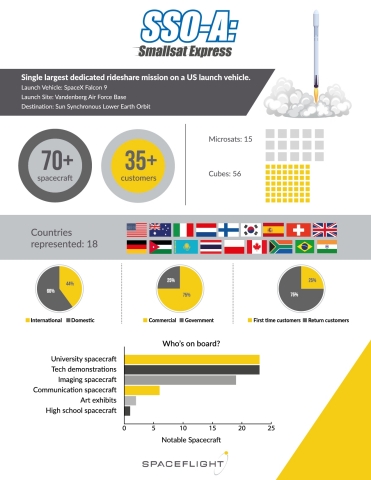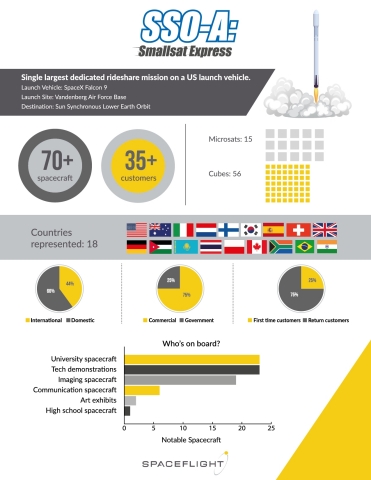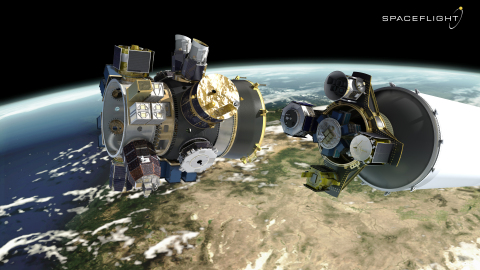SEATTLE--(BUSINESS WIRE)--Spaceflight, the leading rideshare and mission management provider, announced details behind its SSO-A mission, the largest single rideshare mission from a US-based launch vehicle to date. Spaceflight has contracted with more than 70 spacecraft from approximately 35 different organizations, to launch from a SpaceX Falcon 9 later this year. The mission, named SSO-A: SmallSat Express, represents the company’s purchase of an entire Falcon 9 to accommodate the growing number of domestic, international, government and commercial customers seeking affordable rideshare options to launch their spacecraft into orbit.
“As our inaugural dedicated rideshare mission, SSO-A: SmallSat Express is a momentous milestone for Spaceflight,” said Curt Blake, president of Spaceflight. “Launching more than 70 satellites from one launch vehicle is a challenging feat and our talented team has made many advances to make this historic launch a reality. As demand for affordable launch options continues to grow, dedicated rideshare missions will play an important role in providing frequent and reliable access to space.”
SSO-A, which signifies the company’s first dedicated rideshare mission to a Sun-Synchronous Low Earth Orbit, is slated to launch from Vandenberg Air Force Base. It includes 15 microsats and 56 cubesats from commercial and government entities, of which more than 30 are from international organizations from 18 countries including United States, Australia, Italy, Netherlands, Finland, South Korea, Spain, Switzerland, UK, Germany, Jordan, Kazakhstan, Thailand, Poland, Canada, South Africa, Brazil, and India.
Planet is sending two SkySat small sats, the primary spacecraft on the launch, along with several Dove cubesats. They are also sponsoring the launch of two cubesats: one from Georgia Institute of Technology and one from University of Colorado Boulder Laboratory for Atmospheric and Space Physics.
Among the spacecraft onboard, 23 are from universities, 19 are imaging satellites, 23 are technology demonstrations, two are art exhibits, and one is from a high school. Seventy-five percent are commercial spacecraft.
A few notable customers include University of North Carolina-Wilmington, NovaWurks, Ghalam, Helios Wire/Sirion Global, King Mongkut's University of Technology North Bangkok (KMUTNB), Astrocast, Honeywell Aerospace, HawkEye 360, Nevada Museum of Art, Fleet Space Technologies, Korea Advanced Institute of Science and Technology, Audacy, Capella Space Corporation, University of Colorado Boulder Laboratory for Atmospheric and Space Physics, and many others.
“Thanks to a grant from the Gordon and Betty Moore Foundation, UNC-Wilmington is ready to launch the first cubesat equipped to provide scientists around the world with a new instrument to study the ocean,” said Dr. John M. Morrison, Professor, Department of Physics and Physical Oceanography and Center for Marine Science at UNC-Wilmington. “It’s been a tremendous team effort with NASA and others to design and build the low-cost, next generation, miniature ocean color sensors aboard a cubesat, and we’re excited to work with Spaceflight to see it off into orbit. By making the data from the SeaHawk-1 available to everyone for free, our hope is to address a number of critical societal needs, especially in coastal regions.”
With the majority of the spacecraft being integrated in Spaceflight’s Auburn, Wash.-facility, the stack is one of the most complex and intricate endeavors the company has undertaken. The smallsats will be integrated with a variety of dispensers and avionics to an upper free flyer and lower free flyer. Spaceflight is handling all the mission management planning, engineering, integration, mission assurance and system engineering processes, regulatory and policy procedures, contracting, and business development for the mission.
Spaceflight has launched more than 140 satellites to date from a variety of launch vehicles including Falcon 9, PSLV, Dnepr, Antares, and Soyuz. It recently announced agreements for launches on Electron, Vega, and LauncherOne. The company has already launched 22 spacecraft on two missions this year and has plans to launch 97 more across six upcoming missions to LEO and GEO by the end of 2018. Additionally, the company has plans for approximately 10 scheduled missions in 2019.
About Spaceflight
Spaceflight is revolutionizing the business of spaceflight by delivering a new model for accessing space. A comprehensive launch services and mission management provider, the company provides a straightforward and cost-effective suite of products and services including state-of-the-art satellite infrastructure and rideshare launch offerings that enable commercial and government entities to achieve their mission goals on time and on budget. A service offering of Spaceflight Industries in Seattle Wash., Spaceflight provides its services through a global network of partners, ground stations and launch vehicle providers. For more information, visit http://www.spaceflight.com.





